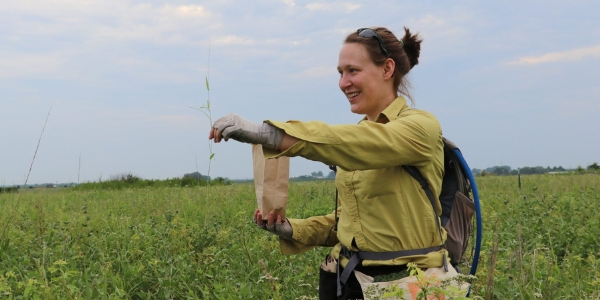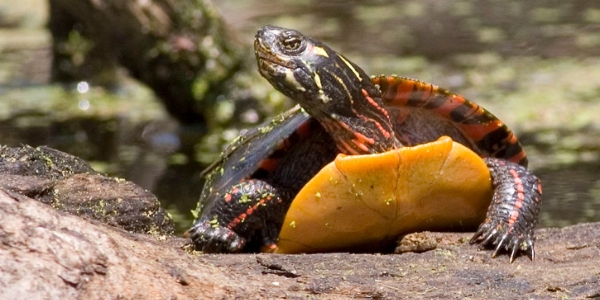Guy Bush, EEB founder and first director, dies
Guy Bush, John A. Hannah Distinguished Professor of Evolutionary Biology Emeritus and a founder of MSU’s Ecology, Evolution, and Behavior Program, died Aug. 2, leaving a legacy of world-class scholarship in evolutionary biology and a tremendous impact to the university. He was 94.
Bush developed a passion for biodiversity as his family moved around the world, his father working for the US Department of Agriculture. After receiving a degree in entomology, he served as a 1st Lieutenant in the

US Army Medical Service Corps.
After completing his doctoral studies in biology at Harvard University and a postdoctoral fellowship at the University of Melbourne, Australia.
By the time he came to MSU in 1981, his groundbreaking work on the apple maggot fly, Rhagoletis pomonella, infesting in the fruit at cherry orchards in Door County, Wisc., had aligned him with key questions of evolution.
Bush was curious how this fly, which had previously specialized on apple and hawthorn fruits, could establish a population on cherries so quickly. He was also curious to discover if this was indeed the same type of fly or if it had undergone genetic changes that would indicate an entirely new host race or species. His work provided a better understanding of the critical role ecological adaptation plays in the origin of species and the development of biodiversity.
His papers have been cited more than 11,000 times in scientific literature. In 2001, he was elected to the American Academy of Arts and Sciences.
“He was a real prince of a human being, super smart, and inspirational in his development of the Rhagoletis system to study sympatric speciation,” said Kay Holekamp, University Distinguished Professor of Integrative Biology. “I was sad when he decided to retire only a few years after I had arrived at MSU. Guy and Don Hall and Mark Scriber thought out very carefully what they wanted to create in the EEB program at MSU and what knowledge EEB alumni should be carrying out into the world with them when they graduated.”
Bush became EEB’s first director in 1987. (It then was known as Ecology, Evolutionary Biology, and Behavior, or EEBB). Integrative biology professor Fred Dyer said Bush, with Don Hall in integrative biology, Mark Scriber in entomology, and others had proposed establishing an interdepartmental PhD specialization. The university allocated money for a secretary and a formal seminar series, and approved a set of graduate level core courses, which Guy played a key role in designing and teaching.
“From the moment of meeting him, I found Guy Bush to be unfailingly kind, warm, and a pleasure to be with,” Dyer said. “For me he represented so much of what I came value about MSU generally, and the EEB program in particular—regardless of pedigree, accomplishments, or honors received—people tend to be decent, collegial, and collaborative. Guy exemplified all of these qualities, in addition to a capacity to lead by action and by example.”
EEB’s own evolution and success played a big part in helping MSU recruit high-caliber scientists from multiple departments who would establish the BEACON Center for the Study of Evolution in Action.
Dyer said he hopes Bush knew of BEACON’s own evolution. “I have little doubt that he would have been pleased by the prominence of MSU's programs in evolutionary science, and by the spirit of collegiality and collaboration that has made this growth possible.”
Bush retired in 2001, first to Door County, and later and returned to Austin, TX, where he had begun his tenure as a professor at the University of Texas. Bush’s obituary notes the family requests donations to the Society for the Study of Evolution the Door County (WI) Land Trust, or Grants in Aid of Research at Sigma Xi.



